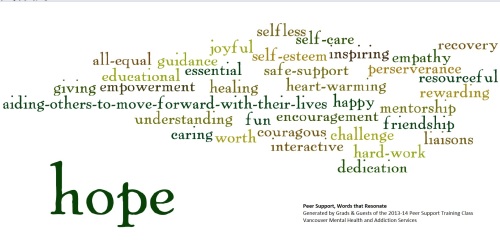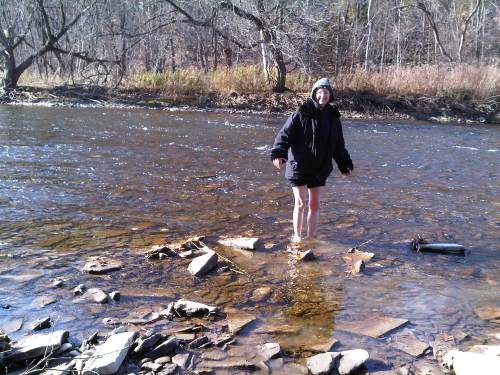
Solitude, Isolation, & How Focusing Can Help

Today’s article is by Jael Emberley. She has been a certified Focusing Trainer since 2010 and has experienced 20+ years of recovery from anxiety and PTSD. Jael brings compassion, optimism and fun to group workshops. Acknowledging and addressing challenges is balanced with celebration and enjoyment.

Photo of Jael taken in 2010 in Ontario during a focusing retreat. She was barefoot, the water was cold & she was in it for about 30 seconds. It was fun! The photo illustrates an adventure and new experience.
Solitude, Isolation, and How Focusing can help
by Jael Emberley
Focusing can be a bridge for people who experience isolation. Focusing is a skill (natural to some, teachable to most people who want to learn) which helps with thinking, feeling, and connecting with people. http://www.focusing.org
Solitude creates space and safety. We get peace and quiet, away from the prying eyes and ears of other people. We don’t have to explain ourselves. We don’t have to participate and perform.
Solitude conserves resources. There’s no transportation cost, food and drink is always least expensive at home, and if I stay in my pajamas, the laundry doesn’t need to be done as often either.
We learn to avoid people when we are unwell. In addition to whatever else might be going on, those others will judge, stigmatize, criticize and hurt us when we are most vulnerable, and least able to stick up for ourselves and remember our strengths. We aren’t lazy, stupid or irresponsible. We are careful about our resources and aware of how other people might react when we don’t feel positive, happy and “normal” enough to fake it.
This is the positive side of being alone. A chance to rest, and not have to interact with people who probably will not understand.
We “know” that isolation is bad. It’s cited as a real problem by family members, and caring professionals.
Some problems with isolation:
1) I may forget how to have fun even if I’m not feeling terrible anymore
2) it becomes more and more difficult to talk to people when I don’t practice ordinary conversation
3) I don’t do enough physical exercise ( that’s ok for a week, longer than a week is a problem)
4) Missed opportunities for growth
5) Lost connections with important people
6) Not experiencing my strength because I’m afraid to test it.
7) A lack of imposed structure means possible poor eating and sleeping habits
How can Focusing help with isolation?
Focusing partnership is well suited to phone conversations. A phone call for an hour can be split into two 25 minute turns, with some time left over for scheduling, so that each person has an equal opportunity to be heard. The Focuser (the one receiving “air time”) has learned some skills that will make really good use of their listener’s skills. The Focuser, in a 25 minute Focusing turn, can experience a shift in perspective, an insight, fresh energy to bring to a problem, or even some space from a feeling that was becoming overwhelming.
Exchanging Listening turns can help me remember how to enjoy conversations. Through Focusing, I can become aware of how much quiet alone time I need, and I gain the energy to reach out once my time of solitude has served its purpose.
Focusing partnership exchanges are between peers. Focusing is a process that puts me in touch with myself. When I am exchanging listening turns, I am fully myself. This feeling of being supported reminds me of the value I bring to a conversation.
Focusing partnership and Focusing support groups can happen by teleconference. The human connection can happen first, before having to negotiate all the complexities of the outside world.

